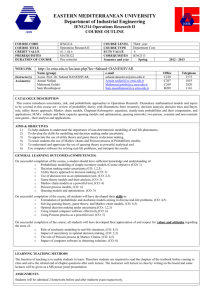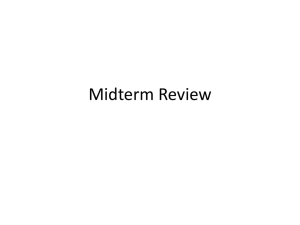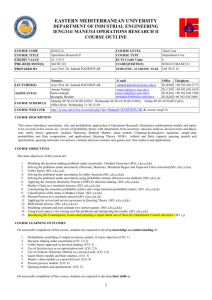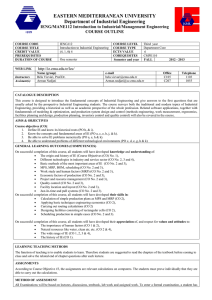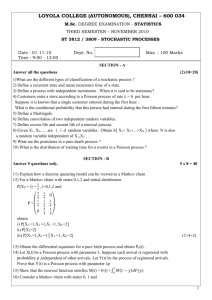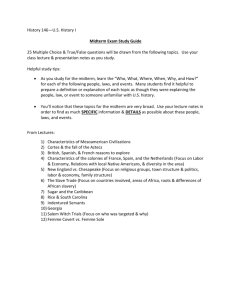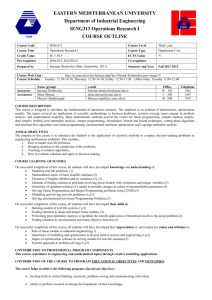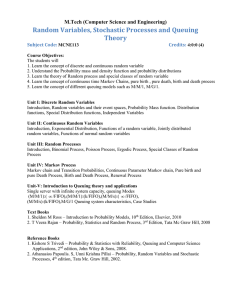Syllabus - Industrial Engineering Department EMU-DAU
advertisement
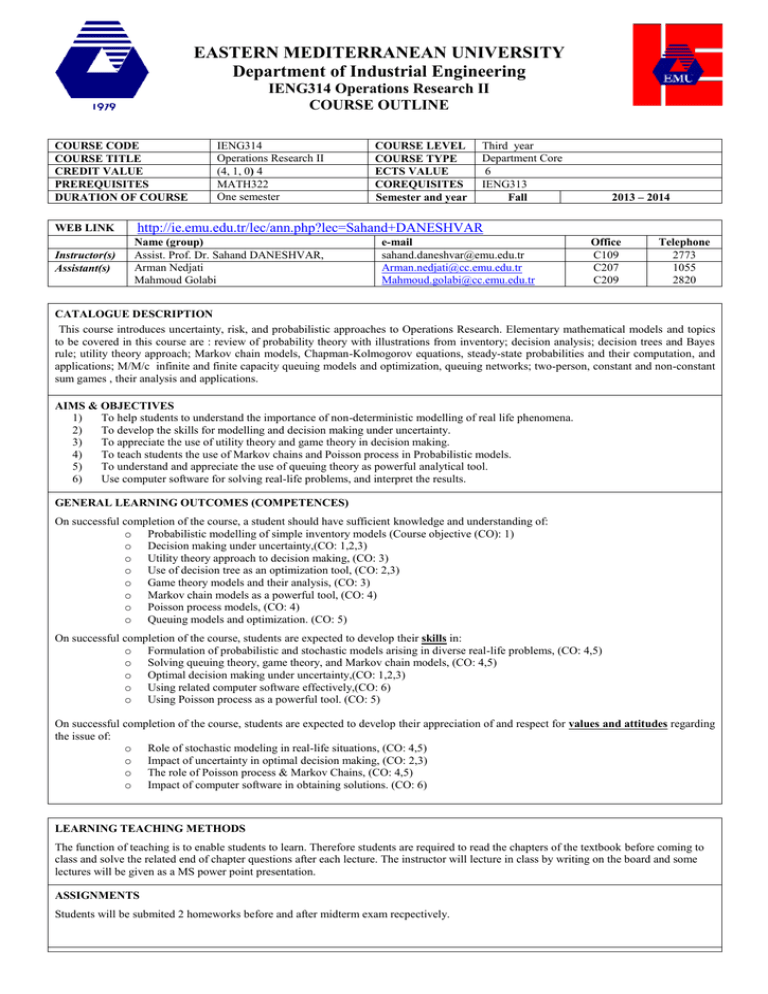
EASTERN MEDITERRANEAN UNIVERSITY Department of Industrial Engineering IENG314 Operations Research II COURSE OUTLINE COURSE CODE COURSE TITLE CREDIT VALUE PREREQUISITES DURATION OF COURSE IENG314 Operations Research II (4, 1, 0) 4 MATH322 One semester COURSE LEVEL COURSE TYPE ECTS VALUE COREQUISITES Semester and year Third year Department Core 6 IENG313 Fall WEB LINK http://ie.emu.edu.tr/lec/ann.php?lec=Sahand+DANESHVAR Instructor(s) Assistant(s) Name (group) Assist. Prof. Dr. Sahand DANESHVAR, Arman Nedjati Mahmoud Golabi e-mail sahand.daneshvar@emu.edu.tr Arman.nedjati@cc.emu.edu.tr Mahmoud.golabi@cc.emu.edu.tr 2013 – 2014 Office C109 C207 C209 Telephone 2773 1055 2820 CATALOGUE DESCRIPTION This course introduces uncertainty, risk, and probabilistic approaches to Operations Research. Elementary mathematical models and topics to be covered in this course are : review of probability theory with illustrations from inventory; decision analysis; decision trees and Bayes rule; utility theory approach; Markov chain models, Chapman-Kolmogorov equations, steady-state probabilities and their computation, and applications; M/M/c infinite and finite capacity queuing models and optimization, queuing networks; two-person, constant and non-constant sum games , their analysis and applications. AIMS & OBJECTIVES 1) To help students to understand the importance of non-deterministic modelling of real life phenomena. 2) To develop the skills for modelling and decision making under uncertainty. 3) To appreciate the use of utility theory and game theory in decision making. 4) To teach students the use of Markov chains and Poisson process in Probabilistic models. 5) To understand and appreciate the use of queuing theory as powerful analytical tool. 6) Use computer software for solving real-life problems, and interpret the results. GENERAL LEARNING OUTCOMES (COMPETENCES) On successful completion of the course, a student should have sufficient knowledge and understanding of: o Probabilistic modelling of simple inventory models (Course objective (CO): 1) o Decision making under uncertainty,(CO: 1,2,3) o Utility theory approach to decision making, (CO: 3) o Use of decision tree as an optimization tool, (CO: 2,3) o Game theory models and their analysis, (CO: 3) o Markov chain models as a powerful tool, (CO: 4) o Poisson process models, (CO: 4) o Queuing models and optimization. (CO: 5) On successful completion of the course, students are expected to develop their skills in: o Formulation of probabilistic and stochastic models arising in diverse real-life problems, (CO: 4,5) o Solving queuing theory, game theory, and Markov chain models, (CO: 4,5) o Optimal decision making under uncertainty,(CO: 1,2,3) o Using related computer software effectively,(CO: 6) o Using Poisson process as a powerful tool. (CO: 5) On successful completion of the course, students are expected to develop their appreciation of and respect for values and attitudes regarding the issue of: o Role of stochastic modeling in real-life situations, (CO: 4,5) o Impact of uncertainty in optimal decision making, (CO: 2,3) o The role of Poisson process & Markov Chains, (CO: 4,5) o Impact of computer software in obtaining solutions. (CO: 6) LEARNING TEACHING METHODS The function of teaching is to enable students to learn. Therefore students are required to read the chapters of the textbook before coming to class and solve the related end of chapter questions after each lecture. The instructor will lecture in class by writing on the board and some lectures will be given as a MS power point presentation. ASSIGNMENTS Students will be submited 2 homeworks before and after midterm exam recpectively. METHOD OF ASSESSMENT All Examinations will be based on lectures, discussions, textbook and assigned work. To enter a formal examination, a student has to present her/his EMU student Identification card to the invigilator. Attendance: Each student can take between 0-4% of total point by his/her continuous attendance. Quizzes: There will be four quizzes designed to test familiarity and basic understanding of various topics. The best three between these four will be considered in final point calculation. There will be no quiz make-ups. Midterm Exam: The midterm exam will be held in the week designated by the university administration. It will cover all of the material up to the date of examination. Final Exam: The final exam will cover the whole course material. In form it will be a longer version of the midterm exam. Make-up Exams: Make-up examinations will only be offered to students who provided adequate documentation for the reason of their absence within four working days at the latest after the examination date. One final exam type make-up exam will be offered after the final exams for the missed midterm and/or final exam. University regulations apply for graduation make-ups. Any objection to the grade or mark should be made latest within a week following its announcement. Grading Policy: Attendance: Homework: Quizzes: Midterm Exam: Laboratory: Final Exam: 4% 2%+2% 5 %+5% + 5% 26 % 15 % 36 % Note that the instructor reserves the right to modify these percentages in case it is found necessary. You will be informed from the changes, if any. ATTENDANCE Attendance will be taken every lecture hour. Note that university regulations allow instructors to give a grade of NG (Nil Grade) to a student whose absenteeism is more than 30% of the lecture/lab hours and/or who do not complete sufficient work that are included in the assessment of the course. TEXTBOOK/S Wayne L. Winston, Operations Research – Applications and Algorithms, Duxbury Press, 4th edition, 2004. J. K. Sharma, Operations Research – Theory and Applications, Macmillan India Ltd, 3th edition, 2007. REFERENCES (available at EMU Library) Frederick S. Hiller and G. L. Lieberman, Introduction to Operations Research, McGraw-Hill, 9th edition, 2009. Hamdy A. Taha, Operations Research: An Introduction, Prentice Hall, 7th edition, 2003. Note that EMU Library has quite a good collection of books on operations research area both at the intermediate and advanced levels. COURSE CONTENT AND SCHEDULE Monday Thursday Friday Office Hour Week 1 Lecture Hall Time IE-D201 14:30-16:20 IE-D201 12:30-14:20 Lab 10:30-11:20 Thursdays 14:30-16:30 Additional Lab Classes: 28 October 2013 14:30-16:20 16 December 2013 14:30-16:20 Quiz 1: Quiz 2: Quiz 3: Quiz 4: 31 October 11 November 19 December 30 December 2013 2013 2013 2013 12:30-13:20 14:30-15:20 12:30-13:20 14:30-15:20 Topics 2 - Review of Probability Theory Using advanced feature of the Performance Improvement Decision Making under Uncertainty 3 Utility Theory 4 Utility Theory 5 Decision Trees 6 Decision Trees Management Software (PIM-DEA). 7-8 Analytic Hierarchy Process (AHP) 8-9 Midterm Exam 10 Markov Chains 11 Markov Chains 12 Poisson Process 13 Queuing Models 14 Queuing Models 15 Game Theory 16 - 18 Final Exam Contribution of the Course to meeting the requirements of Criterion 5 Mathematics and Basic Sciences: 50% Engineering Science : 30 % Engineering Design : 20% General Education : - Relationship of Course to Program Outcomes Program Outcomes Level of Satisfaction of the Program Outcomes : Not Applicable : Low Level of Satisfaction : High Level of Satisfaction (a) an ability to apply knowledge of mathematics, science and engineering (b) an ability to design and conduct experiments, as well as to analyze and interpret data (c) an ability to design a system, component, or process to meet desired needs within realistic constraints such as economic, environmental, social, political, ethical, health and safety, manufacturability, and sustainability (d) an ability to function on multi-disciplinary teams (e) an ability to identify, formulate, and solve engineering problems (f) an understanding of professional and ethical responsibility (g) an ability to communicate effectively (h) the broad education necessary to understand the impact of engineering solutions in a global, economic, environmental, and societal context (i) a recognition of the need for, and an ability to engage in life-long learning (j) a knowledge of contemporary issues (k) an ability to use the techniques, skills, and modern engineering tools necessary for engineering practice ACADEMIC HONESTY - PLAGIARISM Cheating is copying from others or providing information, written or oral, to others. Plagiarism is copying without acknowledgement from other people’s work. According to university by laws cheating and plagiarism are serious offences punishable with disciplinary action ranging from simple failure from the exam or project, to more serious action (letter of official warning suspension from the university for up to one semester). Disciplinary action is written in student records and may appear in student transcripts. PLEASE KEEP THIS COURSE OUTLINE FOR FUTURE REFERENCE AS IT CONTAINS IMPORTANT INFORMATION
